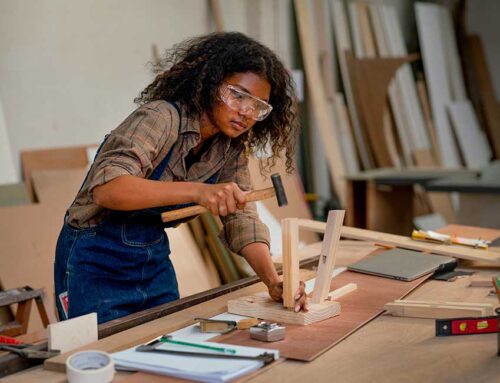Woodworking is a rewarding craft that combines creativity with practicality, allowing you to transform raw materials into beautiful and functional items. For beginners, the journey into woodworking can seem daunting, with an array of tools, techniques, and terminology to navigate. Drawing on extensive experience, this blog post offers practical advice to help those looking to start their journey in woodworking, ensuring a smooth and enjoyable introduction to this fulfilling hobby.
START WITH A SOLID FOUNDATION
Understand the Basics: Before diving into projects, familiarize yourself with the basic concepts of woodworking. This includes understanding different types of wood, learning about grain direction, and recognizing the importance of moisture content in wood. Books, online resources, and local classes can be invaluable in building a solid foundation of knowledge.
Safety First: Woodworking involves tools that can be dangerous if not used properly. Always wear appropriate safety gear, including safety glasses, hearing protection, and dust masks. Familiarize yourself with the safety features of each tool and never bypass them. Remember, a safe workshop is a productive workshop.
ESSENTIAL TOOLS FOR BEGINNERS
Build Your Toolkit Gradually: Start with a basic set of high-quality tools and add to your collection as your skills and needs grow. Essential hand tools for beginners include a hammer, saw, chisels, measuring tape, and a square. For power tools, consider starting with a drill and a circular saw, which can handle a wide range of tasks.
Quality Over Quantity: It’s tempting to buy inexpensive tools, but investing in higher-quality tools can make a significant difference in your woodworking experience. They typically last longer, perform better, and can lead to more satisfying results.
BEGIN WITH SIMPLE PROJECTS
Start Small: Choose simple projects that match your current skill level to build confidence and skills gradually. Items such as a basic shelf, a simple box, or a workbench are great starter projects. These will teach you fundamental skills like measuring, cutting, and joining wood.
Plan Your Project: Before starting any project, make a detailed plan. This should include a list of materials, dimensions, and a step-by-step guide to the construction process. Planning helps minimize mistakes and can save time and resources.
LEARN FROM MISTAKES
Embrace Imperfections: Every woodworker, no matter how experienced, makes mistakes. View these as learning opportunities rather than failures. With every project, you’ll gain invaluable experience that will improve your craftsmanship over time.
Document Your Progress: Keep a journal of your projects, including notes on what went well and what didn’t. This personal log can be a great way to track your progress and reflect on your learning journey.
JOIN A COMMUNITY
Seek Support: Woodworking communities, both online and in-person, can be fantastic sources of support, advice, and inspiration. Join forums, attend local workshops or classes, and connect with other woodworkers. The woodworking community is known for its willingness to share knowledge and help beginners.
PRACTICE AND PATIENCE
Regular Practice: Woodworking skills improve with practice. Dedicate time to your craft, experiment with different techniques, and don’t be afraid to tackle new challenges.
Be Patient: Progress in woodworking can sometimes be slow, and it’s important to be patient with yourself as you learn. Enjoy the process as much as the final product.
Starting your journey into woodworking can be one of the most rewarding decisions you make. With the right approach, tools, and mindset, you’ll find that woodworking opens up a world of creativity, satisfaction, and endless possibilities. Remember, every expert woodworker was once a beginner. With persistence and passion, you’ll soon be creating pieces you’re proud to show off. Happy woodworking!

























